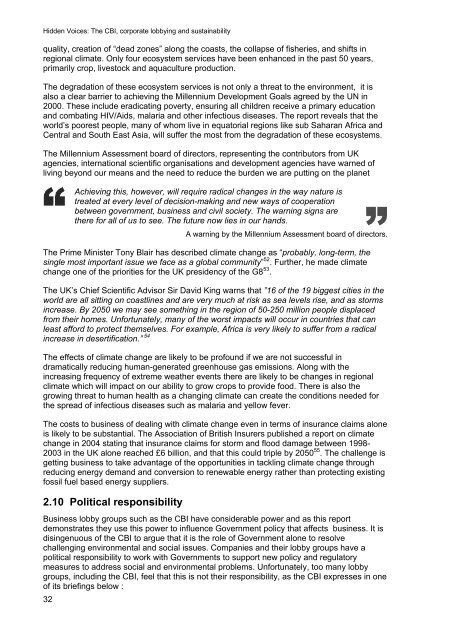hidden_voices
hidden_voices
hidden_voices
You also want an ePaper? Increase the reach of your titles
YUMPU automatically turns print PDFs into web optimized ePapers that Google loves.
Hidden Voices: The CBI, corporate lobbying and sustainabilityquality, creation of “dead zones” along the coasts, the collapse of fisheries, and shifts inregional climate. Only four ecosystem services have been enhanced in the past 50 years,primarily crop, livestock and aquaculture production.The degradation of these ecosystem services is not only a threat to the environment, it isalso a clear barrier to achieving the Millennium Development Goals agreed by the UN in2000. These include eradicating poverty, ensuring all children receive a primary educationand combating HIV/Aids, malaria and other infectious diseases. The report reveals that theworld’s poorest people, many of whom live in equatorial regions like sub Saharan Africa andCentral and South East Asia, will suffer the most from the degradation of these ecosystems.The Millennium Assessment board of directors, representing the contributors from UKagencies, international scientific organisations and development agencies have warned ofliving beyond our means and the need to reduce the burden we are putting on the planetAchieving this, however, will require radical changes in the way nature istreated at every level of decision-making and new ways of cooperationbetween government, business and civil society. The warning signs arethere for all of us to see. The future now lies in our hands.A warning by the Millennium Assessment board of directors.The Prime Minister Tony Blair has described climate change as “probably, long-term, thesingle most important issue we face as a global community” 52 . Further, he made climatechange one of the priorities for the UK presidency of the G8 53 .The UK’s Chief Scientific Advisor Sir David King warns that ”16 of the 19 biggest cities in theworld are all sitting on coastlines and are very much at risk as sea levels rise, and as stormsincrease. By 2050 we may see something in the region of 50-250 million people displacedfrom their homes. Unfortunately, many of the worst impacts will occur in countries that canleast afford to protect themselves. For example, Africa is very likely to suffer from a radicalincrease in desertification.” 54The effects of climate change are likely to be profound if we are not successful indramatically reducing human-generated greenhouse gas emissions. Along with theincreasing frequency of extreme weather events there are likely to be changes in regionalclimate which will impact on our ability to grow crops to provide food. There is also thegrowing threat to human health as a changing climate can create the conditions needed forthe spread of infectious diseases such as malaria and yellow fever.The costs to business of dealing with climate change even in terms of insurance claims aloneis likely to be substantial. The Association of British Insurers published a report on climatechange in 2004 stating that insurance claims for storm and flood damage between 1998-2003 in the UK alone reached £6 billion, and that this could triple by 2050 55 . The challenge isgetting business to take advantage of the opportunities in tackling climate change throughreducing energy demand and conversion to renewable energy rather than protecting existingfossil fuel based energy suppliers.2.10 Political responsibilityBusiness lobby groups such as the CBI have considerable power and as this reportdemonstrates they use this power to influence Government policy that affects business. It isdisingenuous of the CBI to argue that it is the role of Government alone to resolvechallenging environmental and social issues. Companies and their lobby groups have apolitical responsibility to work with Governments to support new policy and regulatorymeasures to address social and environmental problems. Unfortunately, too many lobbygroups, including the CBI, feel that this is not their responsibility, as the CBI expresses in oneof its briefings below :32


